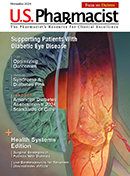Published April 27, 2016
Androgen-Deprivation Users Need to Understand Mental Health Risks
Boston—Androgen-deprivation therapy (ADT) increases the risk of depression and mental health treatment in patients being treated for localized prostate cancer (PCa), according to new research.
The study, published recently in the Journal of Clinical Oncology, found that, when compared to patients who did not receive the therapy, patients on ADT had higher incidences of depression and inpatient and outpatient psychiatric treatment.
“We know that patients on hormone therapy often experience decreased sexual function, weight gain and have less energy—many factors that could lead to depression. After taking a deeper look, we discovered a significant association between men being treated with ADT for PCa and depression,” explained senior author Paul Nguyen, MD, of Brigham and Women’s Hospital in Boston.
“This is a completely under-recognized phenomenon,” Nguyen added in a Brigham and Women’s press release. “Around 50,000 men are treated with this therapy each year. It’s important not only for patients to know the potential side effects of the drugs they’re taking, but also for the physicians to be aware of this risk in order to recognize signs of depression in these patients and refer them for appropriate care.”
He recommended that patients and healthcare professionals “weigh the risks and benefits of ADT, and this additional risk of depression may make some men even more hesitant to use this treatment, especially in clinical scenarios where the benefits are less clear, such as intermediate-risk disease.”
For the study, researchers reviewed data from the SEER Medicare-linked database from 1992 to 2006 of 78,552 men over the age of 65 with stage I to III PCa. The association between ADT and a diagnosis of depression or confirmation of inpatient or outpatient psychiatric treatment was investigated as was the association between duration of ADT and depression.
Results indicate that patients who received ADT had a 23% increased risk of depression, a 29% increased risk of inpatient psychiatric treatment, and a nonsignificant 7% increased risk of outpatient psychiatric treatment, when compared with patients not being treated with ADT.
The study also found that the risk of depression increased with the duration of ADT usage, from 12% with less than 6 months to 26% from 7 to 11 months of treatment, to 37% among patients being treated for a year or longer. Researchers identified a similar duration effect for inpatient and outpatient psychiatric treatment.
“Pharmacologic ADT increased the risk of depression and inpatient psychiatric treatment in this large study of elderly men with localized PCa,” study authors conclude. “This risk increased with longer duration of ADT. The possible psychiatric effects of ADT should be recognized by physicians and discussed with patients before initiating treatment.”
« Click here to return to Weekly News Update.





